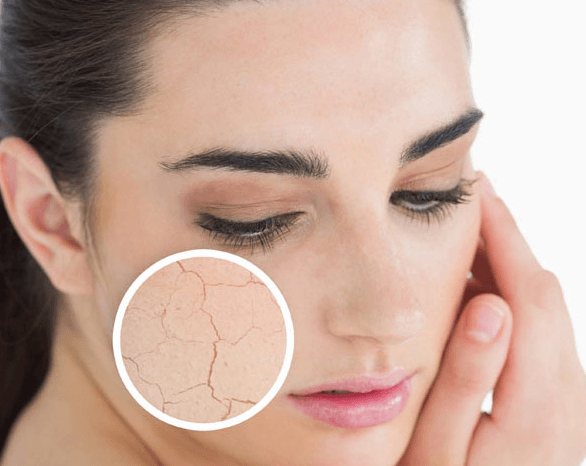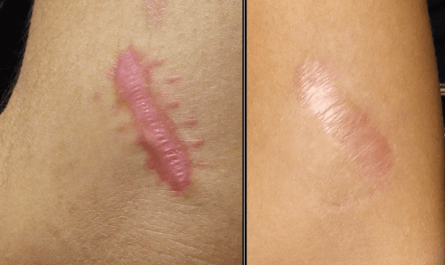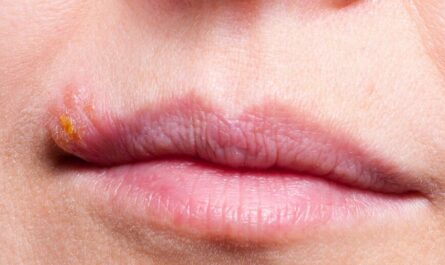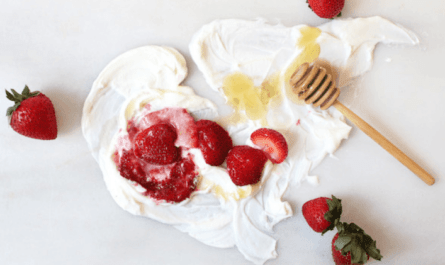Do you suffer from dry, itchy skin that won’t go away? Dry skin can be a frustrating and uncomfortable experience, especially during the colder months when the air is dry. But fear not, as there are plenty of ways to get rid of dry skin. In this article, we’ll explore the 20 best natural remedies to get rid of dry skin. So you can say goodbye to flaky, uncomfortable skin.

Common Causes of dry skin
- Harsh Soaps and Detergents: Excessive use of harsh soaps and detergents can strip the skin of its natural oils, leading to dryness and irritation.
- Cold Weather: Cold weather can cause the skin to lose moisture, leading to dryness and flakiness.
- Hot Showers and Baths: Prolonged exposure to hot water can strip the skin of its natural oils, leading to dryness and itching.
- Low Humidity: Dry air can cause the skin to lose moisture, leading to dryness and flakiness.
- Dehydration: Not drinking enough water can cause the skin to become dry and dull.
- Age: As we age, our skin becomes thinner and less able to retain moisture, leading to dryness and wrinkles.
- Medical Conditions: Certain medical conditions such as eczema, psoriasis, and thyroid disorders can cause dry skin.
- Medications: Certain medications such as diuretics, antihistamines, and retinoids can cause dry skin as a side effect.
- Genetics: Some people are genetically predisposed to dry skin.
- Over-exfoliation: Over-exfoliating the skin can strip it of its natural oils, leading to dryness and irritation.
How to Remove Dry Skin From the Root?
1. Moisturize Your Skin Frequently
Many people skip the moisturizing steps of the beauty routine. Some people think it takes a long time, and some do not like the feeling of lotion on the skin. However, moisturizing is essential for your skincare.
You’d better use moisturizing cream 2-3 times daily. The moisturizer in the morning will allow your skin to hydrate throughout the day. The moisturizer at night will help your skin to heal itself. You can put a small hand cream next to the sink. Use it every time you wash your face and hands.
First, tap your skin with a towel to remove excess water until slightly moist, then apply a moisturizer. If you still feel dry skin, use another layer of moisturizing cream.
There are different creams and moisturizers, so how do you choose? For dry, flaky skin, petroleum jelly-based moisturizers lock in moisture and help reduce dryness. For oily or sensitive skin, choose a non-acne or light moisturizer to leave your skin feeling hydrated, fresh, and not oily.
2. Drink plenty of water
Drinking plenty of water is essential to keeping your skin hydrated and healthy. Dehydration can lead to dry, itchy skin, so it’s important to drink enough water every day. Aim for at least eight glasses of water per day, depending on your body size and activity level.
Water helps to flush out toxins and maintain the balance of fluids in your skin. It also helps to keep your skin hydrated and prevents dryness and irritation. When your skin is hydrated, it helps maintain its elasticity and prevents wrinkles.
It’s important to drink water throughout the day. Starting your day with a glass of water can help you stay hydrated and energized. Carry a water bottle with you to stay hydrated throughout the day.
3. Healthy Diet
A balanced and healthy diet is good for your skin and overall health. It will provide many nutrients and vitamins, which help hydrate the skin and promote health.
Eat more fresh fruit and vegetables such as watermelon, broccoli, and tomatoes. Eat more foods containing unsaturated fats, such as avocado, olive, peanut butter, salmon, walnuts, and tofu.
They can increase blood flow and help deliver nutrients to your skin cells. You can also increase the intake of vitamin E, an antioxidant that can help protect the skin. Try to eat less salty and fried foods, dehydrating the body and exacerbating dry skin.
4. Detox your liver
Detoxing your liver is a great way to get rid of dry skin. The liver is responsible for filtering out toxins and waste from the blood, and when it is overburdened with toxins, the skin can become dry and irritated. By detoxing the liver, you can improve the health of your skin.
- Drinking plenty of water. Aim for eight glasses a day and avoid sugary drinks.
- Eat plenty of fruits and vegetables. These contain antioxidants that help to flush out toxins from the body.
- Increase your intake of healthy fats such as avocados, nuts, and olive oil. These foods help the liver to process toxins more efficiently.
- Eat more fiber-rich foods like legumes, whole grains, and nuts. Fiber helps the body eliminate waste and toxins more quickly.
- Reduce the number of processed foods in your diet. These foods contain a lot of toxins and can be difficult for the liver to process.
- Take supplements such as milk thistle and dandelion root to support the liver. These herbs are known to help the liver to detoxify.
5. Gentle exfoliation
Gentle exfoliation is an effective way to keep your skin smooth. It can help you eliminate dead skin cells, remove excess oil, and smooth your skin. However, many facial scrubs can also strip moisture from the skin and cause dry and itchy skin.
- You can try a damp baby’s washcloth; it can help you gently exfoliate and reduce the skin’s stimulation.
- You can also use exfoliating gloves or a dry skin brush to exfoliate.
- Try to avoid abrasive body scrubs, and moisturize your skin after exfoliating.
- You can exfoliate 2 to 3 times per week for a good result.
6. Choose the right cleansers
Choose the right cleansers because some facial soaps and cleaners contain sodium lauryl sulfate, spices, and some form of alcohol that can remove moisture from the skin and cause severe dryness of your skin. If you feel tight and dry after washing, you may use the wrong product.
Choose a mild, non-scented cleanser such as cream or milk cleaner that can moisturize your skin. You may also consider using a ceramide-based cleaner that helps your skin retain more moisture. Avoid irritating anti-bacterial soap and heavy-scented cleansers that will make your skin drier.
You can also change the product you are using according to the change of the time of year. In the summer, you should use an SPF. In winter, you can switch to a fuller moisturizer.
7. Avoid excessive bathing
To prevent dry and itchy skin, you should avoid long and hot water baths, as this will remove the protective lipid barrier of your skin and make your skin dry.
- You should limit the number of bathing, not more than once a day.
- Use warm water instead of hot water.
- Do not wash for too long, and take a short shower.
- Use a mild moisturizer after taking a bath.

8. Limit Exposure to the Sun
Exposing yourself to too much sun can cause dry skin. Limit your exposure to the sun and protect your skin. This will help keep your skin healthy and hydrated, reducing the risk of dryness.
Wear sunscreen with SPF 30 or higher. Stay out of the sun during the hottest hours of the day, generally between 10 am and 4 pm. Drink plenty of water to keep your skin hydrated. Moisturize your skin daily with a cream that contains hyaluronic acid, glycerin, or petroleum jelly.
Sun exposure can cause dry skin, but harsh products to get rid of it can make it worse. Look for products that are free of fragrance and dyes and opt for natural ingredients. Also, avoid products that contain alcohol, phenol, or salicylic acid, as they can be too harsh on the skin.
9. Wearing hats, scarfs, and gloves
Wearing hats, scarves, and gloves in cold weather especially benefits those with dry skin. The cold weather can strip the skin of its natural oils, leaving it vulnerable to dryness and irritation. By wearing protective clothing, the skin can retain its natural oils and remain moisturized.
Scarves and gloves can be made from natural fibers such as cotton, wool, or silk. These materials help to trap moisture and keep skin looking soft and supple. Hats are usually made from lightweight materials such as polyester or nylon, which allow air to pass through and help the skin to breathe.
In addition, Hats, scarves, and gloves also provide protection from the sun. The sun’s harmful UV rays can cause skin damage and premature aging. By covering up exposed skin, you can reduce the risk of sunburn and other skin problems.

How to Get Rid of Dry Skin With Natural Remedies?
1. Milk
The great thing about milk is that it has anti-inflammatory properties. If your skin is inflamed because it is dry, milk can make it more moisturized. You also have to know that there are some products with milk because milk helps improve the skin’s ability to retain moisture.
- Using a clean washcloth, dip that into warm milk.
- Place that in the dry skin area.
- Leave the washcloth with the milk for about 5 – 10 minutes.
- Wash off the milk with a washcloth that you have dipped in lukewarm water.
- This can be done about 3 – 4 times a week.
2. Tea tree oil
Tea tree oil is a natural antiseptic and antibacterial oil that helps to deeply moisturize and condition the skin. It is an excellent choice for those with sensitive skin, as it is gentle and non-irritating.
Tea tree oil works by penetrating the skin and reducing inflammation. This helps to prevent dryness and cracking, as well as reduce the appearance of wrinkles. It also helps to soothe irritation and itching, making it an ideal choice for those with eczema or psoriasis.
- Mix a few drops of the oil with a carrier oil such as coconut or jojoba.
- Apply the mixture to the affected areas and gently massage in.
- Leave it on for 15-20 minutes, and then rinse it off.
You can also use tea tree oil as a face wash. Mix a few drops of the oil with a gentle cleanser and use it to wash your face twice a day. This will help to reduce inflammation and soothe irritation.
3. Olive Oil
Olive oil is known to contain a lot of antioxidants and fatty acids. These are some of the nutrients that your skin needs. Olive oil can help the skin become more moisturized, and at the same time, it can also help soothe the skin all over.
- Place a small amount of olive oil on the usual moisturizer on your face. If you use a lotion for your body, you can add a small amount of olive oil to help relieve the skin.
- Ensure that you will massage the moisturizer with olive oil in a circular motion on the face area and gently on the body.
- Do this after every bath.
4. Use A Humidifier
Do you often feel the air in your house is very dry, especially when sleeping at night? Dry air will cause your face to shed skin cells quickly and make your skin rough and flaky. At this time, you can put a humidifier in the bedroom; it can prevent the air from becoming too dry and inject more moisture into your skin.
- Try to use pure or distilled water; always clean the humidifier; otherwise, it is easy to breed bacteria.
- Keep your room humidity at around 50% percent.
- You can also put a pot of water in your bedroom to replace the humidifier.
- In addition, you can also try natural plant humidifiers, such as Boston palm tree, fig tree, or bamboo fern.
5. Honey
If you are searching for natural home remedies that can help your skin become moisturized, honey is probably one of the best home remedies you can try.
Honey is known to contain antioxidants, and they are also anti-microbial, which means that your skin will be protected from various microorganisms. Honey can also help lock in moisture to keep it smoother throughout the day.
- Rub honey all over your body for about 5 – 10 minutes.
- You are recommended to take a bath after since this can be very sticky for your whole body.
- You can do this every day if you choose to because this can help keep the skin moisturized.
6. Coconut Oil
If you have never tried coconut oil before, you know that you are missing out. Coconut oil is known to be good for the skin. It can also replenish the amount of moisture the body may have missed because of taking a bath and other activities.
Place coconut oil on your entire body before going to sleep. Make sure that you will not feel too sticky when you do this. You might not sleep because you do not like the feeling.
If you would like to feel more comfortable, you may want to place just the right amount of oil after bathing to lock in the moisture.
7. Avocado
The great thing about avocado is that it has various things that will help the skin improve from the inside. It can also help the skin become smooth and silky because of its Vitamin A content which can help the skin significantly.
- Mash the avocado until it becomes pasty. You do not have to mix it in with anything. You can use just plain avocado.
- Rub the paste you have made in the areas you would like to moisturize.
- Leave the paste on the skin for about 10 – 15 minutes.
- Wash it off.
- This can be done about twice a week for the best results.
8. Aloe Vera
There are a lot of home remedies that you will see that usually use Aloe Vera. Aside from the fact that it can help soothe the effects of dry skin, it can also help naturally moisturize the skin.
- Get a fresh Aloe Vera leaf and cut it in the middle.
- Place the Aloe Vera gel in the dry areas of the skin.
- Place the gel for about 10 – 15 minutes.
- Rinse with warm water.
- This can be done 2x a day.
9. Yogurt
Would you like to make sure that your skin is adequately hydrated? You can achieve this with the use of yogurt. It has anti-inflammatory properties that can help heal the skin if it feels irritated. It can also help get rid of bacteria that may be causing the skin to dry up.
- Choose fresh and unflavored yogurt.
- Place the yogurt directly in the dry areas of your skin.
- Take a bath to remove the yogurt from the skin.
- This can be done every day.
Recommended Reading: 10 Surprising Health Benefits of Yogurt
10. Oatmeal
Oatmeal is a great way to get rid of dry skin. It is a natural exfoliant and can help soothe and hydrate skin. Oats contain compounds called saponins which act as natural cleansers, removing dirt and oil from the skin. Oats also contain beta-glucans which help to lock in moisture and promote healthy skin cell turnover.
- Mix it with enough water to make a paste.
- Apply the paste to the skin and leave it on for 10-15 minutes.
- Rinse the oatmeal off with lukewarm water
- Pat your skin dry with a clean towel.
You can also make an oatmeal bath. Add one cup of oatmeal to a warm bath and soak for 15-20 minutes. The oatmeal will help to hydrate the skin and remove any dirt or oils.
11. Try petroleum jelly
Petroleum jelly is very soft, and it can form a barrier on the skin surface to prevent moisture evaporation from the skin surface. Moreover, it will not clog your pores and irritates your facial skin.
Apply a layer of moisturizer first, and then seal it with a thin layer of petrolatum. You’d better use Vaseline at night; this will maximize the skin’s natural recovery.
When to see a doctor?
When to see a doctor for dry skin? If you have tried lotions and creams and your skin still feels dry, it’s time to get medical advice. If your dry skin is accompanied by other signs of illness, such as fever, redness, swelling, or blistering, you should see a doctor right away. Also, if your dry skin is accompanied by joint pain, fatigue, or a rash, you should seek medical advice.






